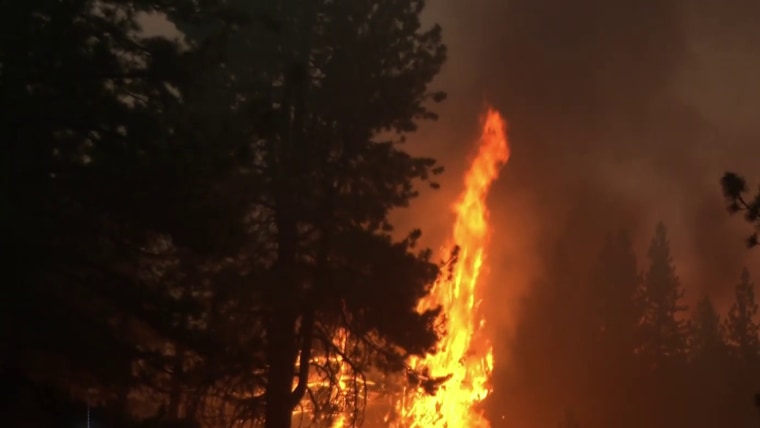When professor Dieter Gerten learned that his home village was one of many hit with torrential rains and severe flooding this week, he was devastated, but not entirely surprised.
For Gerten, a working group leader at Germany’s Potsdam Institute for Climate Impact Research, the deadly floods that swept through the streets of western Europe this week were the latest sign of the crises humanity will face in the years ahead.
“These sorts of events are totally what is expected due to climate projections for the past 30 years, which have said there will be a higher intensity and frequency of heat waves, of droughts and of strong rain events,” he told NBC News.
Gerten acknowledged it was "not easy or possible to link a single event to climate change.” However, he said, it was “possible to link a series of events, as well as the increasing frequency and the increasing intensity.”
Pointing to the recent record-breaking deadly heat wave that affected parts of the western United States and Canada earlier this month, he said the frequency of such weather events could increase if the global community does not do more to combat climate change.
Download the NBC News app for breaking news and politics
Gerten's village, Oberkail, is part of the western state of Rhineland-Palatinate that has borne the brunt of much of the flooding in Germany. The heavy rains caused riverbanks to burst, turning streets into wild waterways that overturned vehicles and reduced houses to rubble.
Storms in neighboring Belgium have also caused deadly flooding, while Luxembourg and the Netherlands were also hit with heavy downpours.
At least 120 people have been killed and hundreds remain unaccounted for in the flooding.
Experts have cautioned that it is too soon to directly blame the floods on climate change, but the science is clear that such disasters could become more common due to its impact.
German politicians, including President Frank-Walter Steinmeier, have nonetheless called for greater efforts to combat global warming.
“Only if we decisively take up the fight against climate change will we be able to limit the extreme weather conditions we are now experiencing,” he said Friday.
Environment Minister Svenja Schulze also tweeted that climate change had "arrived in Germany."
"The events show with what force the consequences of climate change can affect us all, and how important it is for us to adjust to extreme weather events in the future," she said.
Other politicians, including Armin Laschet, the conservative candidate hoping to replace Angela Merkel in Germany's September election, have also called for action.
Calling the disaster an "extreme event," Andreas Friedrich, a German weather service spokesperson, said the affected areas saw "very severe precipitation," with the amount of rainfall usually expected across two months.
However, he said, the degree of devastation had as much to do with where the downpour hit as the rain itself.
"This is a special situation," he said. "In this region, we have small valleys, small rivers and of course, with the big amount of precipitation in a short time, we've had floods and damage in this region."
The states affected were not used to coping with such severe precipitation, meaning they were likely unprepared for the ensuing floods, he said.
Dirk Jansen of the environmental advocacy group Friends of the Earth Germany agreed.
"The forecasts of climate researchers are clear. Man-made climate change means that such extreme weather conditions will increase in [frequency] and intensity. Such extreme weather situations will no longer be singular rare events in the future, but rather, the rule," he said.
“Neither in Europe, nor anywhere else, are they adequately prepared for this,” he added.
Both Gerten and Jansen said they believed European countries and those around the world must do more to prepare for the realities of the effects of climate change, including by investing in climate-resilient infrastructure.
However, they said, the international community should be as focused on preventing climate change as it should be on preparing for it.
The flooding comes as the European Union seeks to set a new standard in addressing climate change, challenging leaders in the global community to match the goals laid out in its plans to reduce carbon emissions.
In its effort to cut net greenhouse gas emissions by 55 percent from 1990 levels by 2030, the 27-nation bloc announced proposals Wednesday that seek to phase out the internal combustion engine entirely.
A carbon border tax that would force certain producers with looser environmental rules to pay a carbon price dictated by the level set by the E.U.’s carbon emissions market was also proposed.
While some have welcomed the plan, Jansen said he felt the bloc’s target still misses the mark. “The European climate protection goals are not ambitious enough,” he said.
He said a reduction in carbon emissions by 55 percent by 2030 was not enough to meet the limit set out by the Paris Agreement, a global climate pact that nearly every nation in the world signed up to in 2015.
"We need at least 65 percent for this," he said.
"There is still time to handle this and cut emissions as proposed in the Paris climate agreement," Gerten said.
The best bet the global community has in combating the effects of climate change, he said, is "reducing greenhouse gas emissions as fast and effectively as possible because the more we emit into the atmosphere, the more these extremes will increase in the future".
Article From & Read More ( Deadly floods shook Europe. Is it ready for future climate change-related disasters? - NBC News )https://ift.tt/3ko5ZzA
World
Bagikan Berita Ini















0 Response to "Deadly floods shook Europe. Is it ready for future climate change-related disasters? - NBC News"
Post a Comment